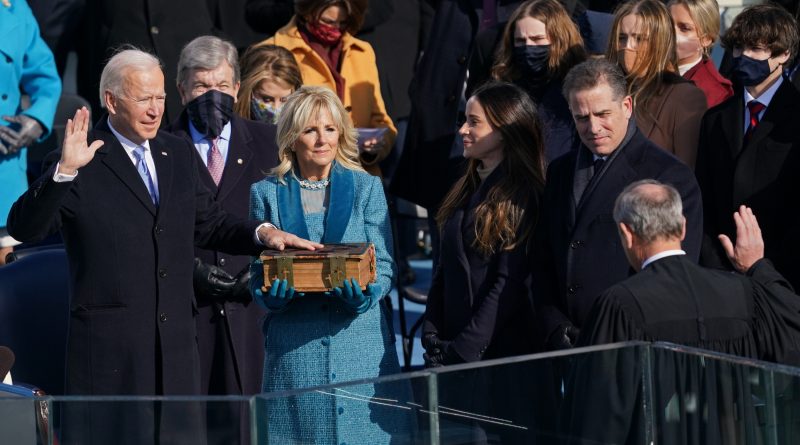The Beginnings of a New Presidency
President Joe Biden faces a range of challenges from coronavirus to racial inequality
Key Actors:
- Joe Biden; president of the United States
Inauguration Day
Joe Biden was sworn in on January 20 at the West Front of the Capitol. Former presidents were in attendance among about 1,000 socially distanced guests. However, former President Donald Trump was not present, making him one of the few presidents who have not attended their successor’s inauguration. The celebrations this year were notably different from previous inaugurations: instead of massive crowds, there was a “sea of flags” which gave the impression that the mall was packed, as well as an intense security perimeter around Capitol Hill due to the insurrection on January 6. In Biden’s speech, he said that “democracy has prevailed” and pleaded for national unity.
Coronavirus Action
Biden’s COVID plan utilises significant federal authority to contain the virus. With over 420,000 pandemic deaths, COVID is certainly at the top of the administration’s agenda.
On January 22, Biden re-joined the World Health Organisation (WHO), an action celebrated by the scientific community. Trump withdrew America from the agency in April of 2020 because it had “failed its basic duty” — to properly assess the pandemic when it first emerged. The WHO has expressed gratitude towards Biden’s decision. The United States’ participation in the organisation will assist the agency in meeting its budget and prevent Americans from contracting new variants of COVID-19.
Vaccinations are another consideration for the president. Lately, there have been complaints from multiple states regarding inadequate vaccine supply and poor planning. “This is unacceptable. Lives are at stake,” Biden said on January 26. To this end, his administration boosted the purchase of coronavirus vaccines with the aim of protecting 300 million Americans by the end of summer or early fall. The president also promised more transparency—with three press briefings weekly—and plans to set up a national contact-tracing programme.
Critics of Biden’s coronavirus response have suggested that these actions overreach federal authority. Nevertheless, these views are popular with the Democratic Party and accepted as the role the government should play in a pandemic.
Climate Change and the Economy
On his first day in office, Biden re-joined the Paris Climate Accords from which President Trump withdrew in 2019. While Biden does not embrace the Green New Deal—a jobs and climate proposal from the leftist echelons of the Democratic party—he does suggest large federal investment in green technology research and has promised to hold a world climate summit in his first 100 days in office.
The day after his inauguration, Biden unveiled a $1.9 trillion dollar coronavirus rescue package dubbed “The American Rescue Plan.” Some of the provisions under the plan included direct payments of $1,400 to most Americans, an increase of the federal minimal wage to $15, state and local government aid, increased COVID testing, and a national vaccination program. A plan outlining the president’s longer-term goals is expected in February.
Biden’s Stance on other Issues
On foreign policy, Biden is set to shift away from Trump’s isolationist attitude. Nevertheless, he has emphasised in the past that he would focus on domestic issues first. Biden has stated he wants to repair the U.S.’s relationship with allies (particularly N.A.T.O.). The president also said that China must be responsible for its unfair trade and environmental practices. Overall, Biden’s foreign policy is vague and largely uncertain.
In the wake of race protests over the summer, Biden plans for criminal justice reform and grants for minority communities. The president acknowledges that racism in America must be dealt with via broad socio-economic reforms that support minorities, but he has rejected calls to defund the police.
Finally, on immigration, Biden has pledged to reverse Trump-era policies that separate children from their parents at the Mexican border. He also strives to protect “Dreamers”—illegally brought children that were permitted to stay in the U.S. under Obama’s policies. On January 26, a judge blocked Biden from pausing deportations. This was an early blow to a critical immigration priority set by the president.
Bibliography
Blake, Aaron, and Eugene Scott. “Analysis | Joe Biden’s Inauguration Speech Transcript, Annotated.” Washington Post, https://www.washingtonpost.com/politics/interactive/2021/01/20/biden-inauguration-speech/. Accessed 26 Jan. 2021.
Franck, Thomas. “Biden’s $1.9 Trillion Covid Relief Plan Calls for Stimulus Checks, Unemployment Support and More.” CNBC, 14 Jan. 2021, https://www.cnbc.com/2021/01/14/biden-stimulus-package-details-checks-unemployment-minimum-wage.html.
“Joe Biden: Where Does He Stand on Key Issues?” BBC News, 19 Jan. 2021. www.bbc.com, https://www.bbc.com/news/election-us-2020-53575474.
Merchant, Nomaan. “Judge Bars Biden from Enforcing 100-Day Deportation Ban.” AP NEWS, 26 Jan. 2021, https://apnews.com/article/joe-biden-immigration-texas-barack-obama-51688033e490d50867e52ef9c8ec574f.
The Associated Press. “Biden Outlines ‘wartime Effort’ to Boost Distribution of COVID-19 Vaccines.” CBC, 26 Jan. 2021, https://www.cbc.ca/news/world/biden-vaccine-covid-pfizer-moderna-1.5888838.
Weintraub, Karen. “Biden Administration Renewed Support for World Health Organization Is ‘good News for America and the World,’ Scientists Say.” USA TODAY, https://www.usatoday.com/story/news/health/2021/01/22/scientists-applaud-biden-decision-rejoin-world-health-organization/4243377001/. Accessed 26 Jan. 2021.

